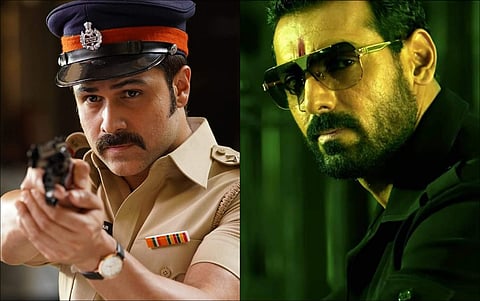Mumbai Saga Movie Review: A retelling of the template gangster story that has its moments
Rating:(2.5 / 5)
For a film that has ‘saga’ in its title, the runtime of Mumbai Saga is only a little over 120 minutes. It isn’t so much a saga as just another footnote in the underworld story often portrayed in Sanjay Gupta's films. With Mumbai Saga, the filmmaker returns to this world after a span of eight years, and… nothing has changed. His characters haven’t. His visual style hasn’t, and neither has his trademark dialogue-baazi. In a constantly evolving world, Sanjay Gupta films remain grounded in the past. And that is not necessarily a bad thing.
These are films where characters say lines like, “Bura vakt, bura khabar, bin bulaaye hi aati hai” and “Yeh seedi mein hum upar jaa rahe hain, aur tum neeche jaa rahe ho,” and walk away in slow motion wearing their sunglasses. Although this genre seems to be past its sell-by date, filmmakers like Sanjay try and eke out one more look into the life and times of a Mumbai gangster. Mumbai Saga essentially plays out like a Sanjay Gupta greatest-hits album and does a decent job of keeping us engaged.
Director: Sanjay Gupta
Cast: John Abraham, Emraan Hashmi, Kajal Aggarwal, Mahesh Manjrekar
Manya Surve… I mean, Amartya Rao (John Abraham picking up from where he left off in Shootout at Wadala) is forced to pick up the cudgels to save his brother’s life. Amartya is sent to jail where Potya… I mean, Gaitonde (Amole Gupte hamming it up like it’s nobody’s business) wants to kill him. Amartya becomes a dreaded gangster with the help of a politician (Mahesh Manjrekar, in a chillingly effective performance). In between all this, we find a dispensable businessman, even more dispensable henchmen, and encounter specialist Vijay Savarkar (Emraan Hashmi breathing life into an ordinary role) who suddenly decides to annihilate Amartya and Co. While Vijay is introduced as a cop with a sinister motive, the revelation of his actual agenda is one of the many twists that Sanjay bombards us with in the final act.
Sanjay’s gangster films aren’t exactly known for their subtlety. Take, for instance, the multiple betrayals that happen throughout the film. Each of them is foreshadowed by the camera lingering a second too long on the prospective Brutus. This spoils the very little suspense that is present in a cliched tale of a gangster’s origin, wrath, and ultimate downfall.
On the other hand, the characterisation of Kajal Aggarwal, who plays Amartya’s better half, Seema, is refreshing. She is someone who looks at Amartya and smiles right after he commits his first act of violence. She sits with him and his coterie in a coffee shop plotting the downfall of Gaitonde. She is the one who 'subtly' coerces a family into getting their daughter married to Amartya’s brother (Prateik Babbar). On a side note, it would be interesting to see Sanjay return to the underworld soon with a female-fronted film.
Mumbai Saga heavily relies on the action setpieces that are pumped with overdoses of testosterone. I particularly liked the progression of violence in this film. When Amartya is just starting out, he lets his hands do all the bone-crunching. As he climbs up the gangster world, bullets replace punches. Full points to the action directors (Anbariv) for acing both types of sequences. However, while John Abraham establishes his action hero credentials, Emraan is handed a raw deal even in the Mission Impossible-inspired bathroom fight sequence.
Mumbai Saga isn’t just about blood, bullets, brotherhood, and betrayal. It nudges at how all these gangsters, however much their lives are glorified on screen, are only pawns of the system. The cops and politicians arm-twist youngsters to do their bidding and turn them into gangsters. We have seen in many films, including in those of Sanjay Gupta, how things end for these trigger-happy gangsters. And beneath all the style (cinematographer Shikhar Bhatnagar and composer Amar Mohile are huge pluses) and substance, Sanjay, in his own way, continues to pose a pertinent question through his films — Who would put an end to a system that is always on the lookout for the Surves, Dolas’ and Raos? Now that is one never-ending saga.

